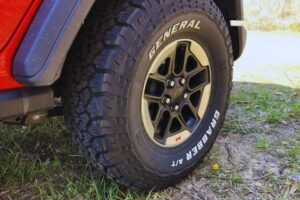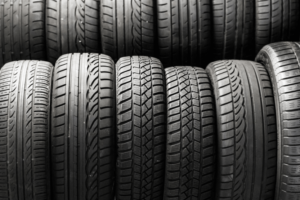Many drivers have experienced the unsettling feeling of hearing their car make a sound like it has a flat tire, only to find that the tire is perfectly fine.
This can be a confusing and frustrating issue, as it is often difficult to pinpoint the exact cause of the noise. However, there are several potential reasons why a car might make this sound.
One common cause of a car sounding like it has a flat tire when it doesn’t is low tire pressure. Even if the tire is not actually flat, it may be significantly underinflated, which can cause it to make a flapping or thumping sound as it rotates.
This can be easily remedied by inflating the tire to the recommended pressure levels. However, there are other potential causes of this noise as well, such as worn shocks, bad tires, or alignment issues.
Understanding Car Sounds and Tire Issues

When driving a car, it is important to be aware of any unusual sounds that may indicate a problem with the vehicle.
One common issue that drivers may encounter is a sound that resembles a flat tire, even when the tire is not actually flat. In this section, we will explore the causes of this sound and how to identify it.
Identifying a Flat Tire Sound
A flat tire sound can be described as a flapping or thumping noise that seems to be coming from one of the wheels. It may sound like a tire is losing air or is completely flat, but upon inspection, the tire appears to be fully inflated.
This sound can be alarming for drivers, but it is important to remain calm and try to identify the source of the noise.
Common Causes of Tire Noise
There are several reasons why a car may produce a fake flat tire sound. One of the most common causes is low tire pressure.
When the air pressure in a tire is too low, it can cause the tire to deform and create a flapping sound as it rotates. Other causes of tire noise can include worn tires, wheel imbalance, faulty wheel bearings, damaged wheels, brake issues, and winter tires.
Distinguishing Between Tire and Wheel Noises
It is important to note that not all tire noises are caused by flat tires. Some noises may be coming from the wheels themselves, rather than the tires. For example, a grinding sound may indicate an issue with the brake pads, while a thumping noise may be caused by a damaged wheel bearing.
By paying close attention to the sound and any accompanying symptoms, such as vibrations or changes in handling, drivers can better identify the source of the problem.
In summary, a fake flat tire sound can be caused by a variety of factors, including low tire pressure, worn tires, and wheel imbalance.
By understanding the common causes of tire noise and paying close attention to the sound and any accompanying symptoms, drivers can better identify the source of the problem and take the necessary steps to address it.
Diagnosing the Problem
When a car sounds like it has a flat tire but doesn’t, the first step is to diagnose the problem. There are several factors that could be causing the issue, and it’s important to check each one thoroughly. Here are some steps to take when diagnosing the problem.
Inspecting for Visible Tire Damage
The first step in diagnosing the problem is to inspect the tires for visible damage. Look for any punctures, cuts, or bulges in the tire. If there is visible damage, it’s likely that the tire needs to be replaced.
Checking Tire Pressure and Tread Depth
If there is no visible damage to the tire, the next step is to check the tire pressure and tread depth. Low tire pressure can cause the tire to sound like it’s flat, even if it’s not.
Use a tire pressure gauge to check the pressure of each tire. If the pressure is low, inflate the tire to the recommended pressure level.
Tread depth is also important to check. If the tire tread is worn down, it can cause the tire to sound like it’s flat. Use a tread depth gauge to measure the depth of the tire tread. If the tread is worn down, the tire needs to be replaced.
Evaluating Wheel Bearings and Alignment
If the tire pressure and tread depth are both fine, it’s possible that the issue is with the wheel bearings or alignment. Worn wheel bearings can cause a humming or rumbling noise, while improper alignment can cause uneven tire wear.
To check the wheel bearings, lift the car off the ground and spin each wheel. If you hear a grinding or rumbling noise, the wheel bearings may need to be replaced.
For alignment issues, look for uneven tire wear. If the tire tread is worn down on one side of the tire, it’s likely that the alignment is off. Take the car to a mechanic to have the alignment checked and adjusted if necessary.
In summary, when a car sounds like it has a flat tire but doesn’t, it’s important to inspect the tires for visible damage, check the tire pressure and tread depth, and evaluate the wheel bearings and alignment.
By taking these steps, it’s possible to diagnose the issue and take the appropriate action to fix it.
Potential Causes of Misleading Tire Sounds

When a car sounds like it has a flat tire but doesn’t, it can be confusing and concerning. There are several potential causes of misleading tire sounds that drivers should be aware of. In this section, we’ll explore some of the most common causes of this issue.
Worn or Faulty Wheel Bearings
One possible cause of misleading tire sounds is worn or faulty wheel bearings. Wheel bearings are responsible for allowing the wheels to rotate smoothly on the axles.
When they become worn or damaged, they can produce a variety of sounds, including grinding, humming, or growling noises. These sounds can be mistaken for a flat tire, especially if they become more pronounced at higher speeds.
Issues with Suspension and Brakes
Issues with a car’s suspension or brakes can also cause it to sound like it has a flat tire. For example, worn brake rotors can produce a thumping or flapping sound that can be mistaken for a flat tire.
Similarly, problems with a car’s suspension can cause it to vibrate or produce other unusual sounds that can be misinterpreted as a tire issue.
Effects of Wheel and Tire Mismatch
Another potential cause of misleading tire sounds is a mismatch between the wheels and tires. For example, if a car has a solid flat tire, it can produce a thumping sound that can be mistaken for a flat tire.
Similarly, misaligned wheels or uneven tire wear can cause vibrations or other unusual sounds that can be misinterpreted as a tire issue.
In summary, there are several potential causes of misleading tire sounds in a car. By understanding these causes, drivers can better diagnose and address any issues they may be experiencing.
If you’re unsure about the cause of a tire-related sound in your car, it’s always a good idea to have it checked out by a professional to ensure your safety on the road.
Preventative Measures and Maintenance
To avoid the inconvenience and potential danger of a car that sounds like it has a flat tire but doesn’t, preventative measures and maintenance are key.
Regular inspections and maintenance can help ensure that your car is in good condition and prevent issues from arising. Here are some preventative measures and maintenance tips to keep in mind:
Regular Tire Rotation and Inspection
Regular tire rotation and inspection can help ensure that your tires wear evenly and last longer. Tires that are not rotated regularly can wear unevenly, which can cause them to make noise and affect the handling of your car.
It is recommended to rotate your tires every 5,000 to 7,500 miles, or as recommended by your car’s manufacturer. During the rotation, the mechanic should also inspect the tires for any signs of damage or wear.
Maintaining Proper Wheel Alignment
Proper wheel alignment is essential for the safe and efficient operation of your car. Misaligned wheels can cause uneven tire wear, which can lead to noise and handling issues.
It is recommended to have your wheels aligned every 10,000 miles or as recommended by your car’s manufacturer. If you hit a pothole or an object in the road, it is also a good idea to have your wheels checked for alignment.
Understanding the Impact of Driving Habits
Driving habits can also have an impact on the condition of your tires and the overall performance of your car. Hard braking, accelerating, and cornering can cause excessive wear on your tires and affect the handling of your car.
It is important to drive responsibly and avoid hitting potholes or other objects in the road. Using low-quality or winter tires can also contribute to noise and handling issues, so it is important to choose high-quality tires that are appropriate for your driving conditions.
By following these preventative measures and maintenance tips, you can help ensure that your car stays in good condition and avoid the inconvenience and potential danger of a car that sounds like it has a flat tire but doesn’t.
Troubleshooting and Fixes

If your car sounds like it has a flat tire but doesn’t, there are several things you can do to address the issue. Here are some troubleshooting tips and fixes to help you get to the bottom of the problem.
Addressing Minor Tire and Wheel Issues
One of the most common causes of a car that sounds like it has a flat tire but doesn’t is minor tire and wheel issues. These can include uneven tread wear, damaged wheels, or loose lug nuts.
If you suspect that one of these issues is causing the problem, you can try tightening the lug nuts, having the wheels balanced and aligned, or replacing any damaged tires or wheels.
When to Seek Professional Assistance
If you’ve tried addressing minor tire and wheel issues and your car is still making a sound like it has a flat tire, it may be time to seek professional assistance.
A mechanic can help diagnose the problem and recommend the appropriate fix. This may include repairing a tire puncture, replacing worn shocks, or addressing issues with the CV joint or ball joint.
Long-Term Solutions for Tire Maintenance
To prevent your car from sounding like it has a flat tire in the future, it’s important to take good care of your tires. This includes regularly checking your tire pressure, rotating your tires, and replacing them when they reach the end of their tread life.
If you live in an area with harsh winter weather, you may also want to consider using winter tires to help improve traction and prevent issues like vibration or shaking when accelerating.
In conclusion, if your car sounds like it has a flat tire but doesn’t, there are several potential causes and fixes to consider.
By addressing minor tire and wheel issues, seeking professional assistance when necessary, and taking good care of your tires over the long term, you can help prevent this issue from occurring in the future.
To Sum Up
When a car sounds like it has a flat tire but doesn’t, it could be due to various reasons. The most common cause is low tire pressure, which can lead to a flapping noise from the wheels. Other reasons include worn tires, faulty wheel bearings, damaged wheels, brake issues, and winter tires.
If the car has properly inflated tires, then wheel imbalance or bad wheel alignment could be the culprit.
A wobbling tire due to an unevenly distributed weight can cause a thumping noise. On the other hand, a rusty car rim can also cause a sound similar to that of a flat tire, which is more difficult to manage and could lead to an accident.
It is essential to identify the cause of the issue and fix it promptly to prevent further damage to the car. Regular maintenance and tire checks can help avoid such problems. If the issue persists, it is best to seek professional help from a mechanic to diagnose and fix the problem.
In conclusion, if a car sounds like it has a flat tire but doesn’t, it is essential to check the tire pressure and other possible causes mentioned above. Taking care of the car’s tires and wheels can help prevent such issues and ensure a smooth driving experience.


![Grinding Noise When Braking [9 Possible Causes and How to Fix] grinding noise when braking](https://roadsumo.com/wp-content/uploads/2021/06/grinding-noise-when-braking-150x150.jpg)

![Does Fix-a-Flat Work? [Is Fix-a-Flat Effective?] does fix-a-flat work](https://roadsumo.com/wp-content/uploads/2021/11/does-fix-a-flat-work-150x150.jpg)

![Oil in Coolant [Causes and Solutions to Coolant in Oil] oil in coolant](https://roadsumo.com/wp-content/uploads/2021/10/oil-in-coolant-150x150.jpg)


![Read more about the article Does Fix-a-Flat Work? [Is Fix-a-Flat Effective?]](https://roadsumo.com/wp-content/uploads/2021/11/does-fix-a-flat-work-300x200.jpg)